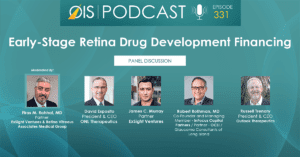From OIS Retina: Questions Answered on How to Secure Early-Stage Financing

Click here to watch the video version of this podcast.
At the latest OIS Retina Innovation Summit in New York, two CEOs and two venture capitalists came together to address pitch meetings, fundraising, and several other questions early-stage innovators have.
With moderator Firas Rahhal, MD, of ExSight Ventures, asking the questions—a role he knows well as a regular OIS Podcast host—the panel started by addressing the challenges of raising money in an economic downturn.
For VCs, Rob Rothman, MD, of InFocus Capital Partners, said funding in alternative assets doesn’t seem to be affected. Investors have plenty of sideline capital they want to deploy in the life sciences. There is, however, more scrutiny into prior fund performance.
What does it take for early-stage companies to secure this funding? David Esposito, president and CEO of ONL Therapeutics, advised start-ups to be willing to adjust strategy as their product evolves. “You’re on a 6- to 12-month run on raising capital, but you’re still accumulating data, and you have to position that data in the best way possible,” he said. “You have to remain flexible as the data unfolds.”
Russell Trenary, president and CEO of Outlook Therapeutics, advised early-stage companies to present the problem and its scope, and their solution in a way that’s easy to understand. If you can’t do that, you run the risk of investors passing you over.
Listen to the podcast today to get your funding questions answered, including:
• How do VCs raise money?
• How does the fall of the stock market affect their approach?
• How do CEOs approach early raises?
• When is the right time to go public?
• After IPO, when and for what reasons does a company raise capital?
• What are the red flags for investors that lead to a rejected pitch?
• When is the right time for a founder to bring in a professional CEO? What criteria do executives look for when accepting a position?
• What’s ahead for retina investment and development over the next 5-10 years?
Click “play” to listen.
